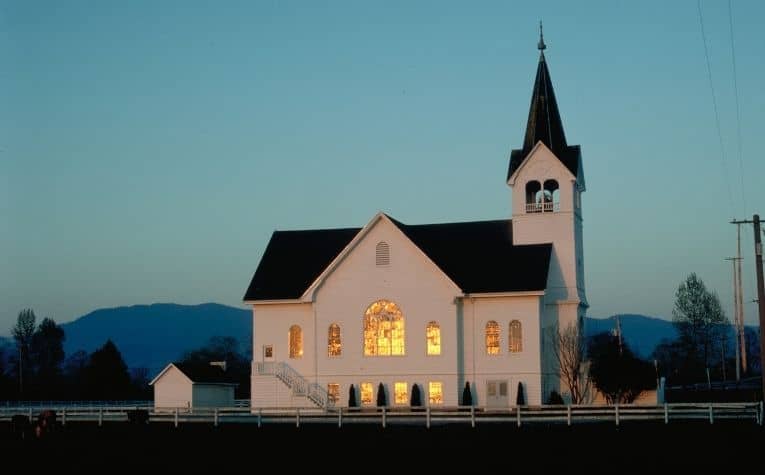Christian denominations like Lutheran, Baptist, Methodist, Presbyterian, and Assemblies of God have clearly defined pathways to pastoral ministry. However, when it comes to non-denominational churches, the path is less defined. So how does a person become a non-denominational pastor?
There are two common ways to become the pastor of a non-denominational church: (1) be offered the role of a pastor by the hiring body of a non-denominational church, or (2) start a non-denominational church and assume the role of pastor.
Even though the path to pastoring a non-denominational church has less uniformity than traditional models, there are concrete steps a person can take to apply, candidate, and become the pastor of such a church. The information below will point a person in the right direction and provide tips for navigating the application and candidating process.

Option 1: A Non-Denominational Church Calls You To Be Pastor
Non-denominational pastors are hired — or “called” by — by non-denominational churches. Rather than working through a denominational representative, like a bishop, presbyter, or regional pastor, non-denominational churches often hire candidates directly after conducting their own independent search and hiring processes.
What to expect in the application and hiring process
Because most denominational churches are independent, they each have their own hiring process. There may be some commonalities between them, but they will likely have their own process, including a unique job description, timeline, pay rate, and benefits package.
Who hires the pastor in a non-denominational church? It depends on the form of government that a church has, which, because of its independent nature, can vary from one non-denominational church to the next.
The process a church uses to hire a pastor is often described in its constitution, which is necessary if the church has 501c3 status under United States law. (Also see the full article What Is a Non-Denominational Church?)
Tip #1 | Request a constitution: When applying to a church, look on their website for a constitution and by-laws or another document that describes their operations. If you can’t find one, email the church or search committee and ask for a copy.
- A governing board: In some non-denominational churches, a governing body like an elder board or deaconate may play a central role in the hiring process.
- A search committee: In other non-denominational churches, a search committee may be formed with volunteers from the body. Some churches establish search committees that are representative. For example, such a committee may include elders or deacons, and also the youth pastor, the head of the women’s ministry, and an accountant, theologian, or teenager.
- An outgoing pastor: In still other non-denominational churches, the outgoing pastor may play an important part in who their replacement is. This is more common when the outgoing pastor is retiring instead of relocating to another church.
First-hand experience: My first pastoring job was with a non-denominational church. Through the hiring process, I met with the search committee and elder board twice before I was invited to preach. On the Sundays I preached as a candidate, I met many people in the congregation who later voted on me for pastor.
What if the open job is not for the senior pastor? If a non-denominational church is hiring a staff person that is not the senior pastor but, for example, a youth pastor or worship pastor, it’s very common for a senior pastor to lead the governing body or search committee in that task. (Also see Evangelical vs. Non-Denominational: What’s the Difference?)
Why do senior pastors lead the search for associate staff? Senior pastors lead the search because associate staff, including the new hire, will be implementing the ministry vision of the senior pastor.
In most cases, associate staff will report to the senior pastor as well. In turn, the senior pastor answers to the governing body regarding the job performance of associate staff.
Why does each church have a different hiring process? In traditional denominations, an applicant or candidate for pastor may undergo the same process in each church for which they are a candidate.
They may even have the same denominational contact person through which they submit applications and other documents. (Also see How to Choose a Denomination?)
In contrast, if a prospective pastor applies for an open position at three different non-denominational churches, they will likely undergo three different processes. Non-denominational churches use their independence to customize their search for a pastor.
Tip #2 | Establish a contact: It is appropriate to ask for an email address or phone number for a member of the search committee. It is not appropriate to “sell yourself” to that contact. It is appropriate to ask for updates on timelines related to the process.
How involved is the congregation in the hiring process of a pastor? The answer depends on the church’s organizing structure and its form of government, which is often described in its constitution. In some churches, the membership votes on a candidate for pastor, even if a governing board or search committee screens the applicants.
To be clear, all churches have a congregation, yet the term “congregational” refers to a specific form of church government in which the membership makes significant decisions, as opposed to an elder-led government, in which the board does. (Also see Do Non-Denominational Churches Perform Baptisms?)
How many votes does it take to offer the role to a person? It depends on what’s stated in the church’s constitution and bylaws. In some churches, it’s a simple majority: 50% plus one. In other churches, the threshold is higher, like 60% or 70% for example. Congregations often vote at a called church meeting that is led by the head of the governing body or search committee.
Why do some churches require more than a simple majority? Some churches require more than a simple majority because they feel it reveals a greater sense of unity in the important decision of hiring a pastor.
If only 50% of the congregation agrees to hire a certain pastor, then roughly half have another perspective, and that can lead to discord in the church. (Also see Can You Be a Christian Without a Denomination?)
Tip #3 | Make authentic connections: If you are invited to preach, or meet the congregation in another way, don’t act like a politician who is running for office. It’s better to have five authentic conversations than ten superficial ones.
What is the hiring process in non-congregational churches? If the congregation doesn’t vote on their next pastor, the responsibility likely belongs to the governing board or search committee.
In this case, the board or committee has not been commissioned to conduct the search, but also to extend an offer. In this model, the congregation may be informed of developments, but it doesn’t have a say in them.
What role do surveys and congregational meetings play? Sometimes those who make decisions for a church, like a board or a committee, will solicit information from the congregation.
Two common ways to do this are passing our paper or electronic (email) surveys or calling in-person meetings to gather views, opinions, and advice from church members. (Also see What Bible Translation Do Non-Denominational Churches Use?)
What is an example survey question? “Would you prefer a younger pastor who the church can help groom for its ministry vision or a more experienced pastor who will groom the church for his ministry vision?”
First-hand experience: I once served as chairman of a search committee for the senior pastor position in a church of 600. We had almost 100 applicants. The search committee narrowed that group to about 25. We narrowed that group down to 8. We interviewed six once. We interviewed 3 of those six twice. We then called one of those 3 to be the next pastor.

How do you find churches that are looking for pastors?
Finding non-denominational churches that are looking for a pastor used to be difficult, but thankfully it’s much easier now, thanks to the internet.
Churchstaffing.com, churchjobs.com, and churchjobsonline.com, are the three best websites to find open pastor positions at non-denominational churches. Information often includes job descriptions, contact information, and some details on the church’s hiring process.
The ten websites below offer users valuable information, and in the middle of a search, it is recommended that they all be checked often for updates.
| Name | Website | Description |
|---|---|---|
| Church Staffing | churchstaffing.com | One of the largest selections of open jobs on the internet. |
| Church Jobs | churchjobs.net | There are usually not as many jobs listed on this site, but sometimes it’s the only place certain positions are posted. |
| Church Job Finder | churchjobfinder.com | Not a huge list, but enough to check often if actively looking for work. |
| Ministry Jobs | ministryjobs.com | Includes recent job postings, but there aren’t a lot of them. |
| Christian Jobs | christianjobs.com | Offers users a premium membership for $15 a month. |
| The Gospel Coalition | thegospelcoalition.com | Well-known national ministry with a good-size jobs board. |
| Church Jobs Online | churchjobsonline.com | Non-denominational churches are their largest job-openings category, followed by Baptist. |
| Vanderbloemen | vanderbloemen.com | A search firm for churches that also list open jobs by category, including non-denominational. |
| Slingshot Group | slingshotgroup.org | A search firm for churches that lists non-denominational openings. |
Tip #4 | Talk to someone on the phone: When applying to open positions online, ALWAYS try and do more than just send in your required documents electronically. Call and attempt to speak with someone involved in the hiring process. Prepare a few good questions to ask them, but don’t “sell yourself” over the phone.
Some of the websites above provide notification services for when a job becomes available in a particular area of the country. If you decide to upload your resume or other documents for public viewing, be aware that other parties not affiliated with the website may try and contact you.
First-hand experience: One time, I posted my resume on a ministry jobs board, and I got contacted numerous times by military recruiters looking for chaplains. I am grateful for Christian chaplains in the Armed Forces, however, that was not the particular role I felt called to.

Option #2: Start a non-denominational church as the pastor
Another way to become the pastor of a non-denominational church is to plant a church in the role of pastor. Planting a church should not be considered a mere professional alternative if no existing church has made someone a job offer. Church planting is a calling, not a fallback option. (Also see Is It a Sin to Change Denominations?)
There are many ministry organizations that help people discern whether or not they are called to plant a church. Seeking wisdom on this matter is necessary before making a decision to pursue this option.
Help with becoming a church planter
There are excellent organizations that help people plant churches. They help people with discernment, expectations, family support, financial support, legal issue, and much more. Below are five church planting networks to consider and explore:
| Name | Website |
|---|---|
| Church Planting | churchplanting.com |
| Acts 29 | acts29.com |
| Dynamic Church Planting International | dcpi.com |
| Every Nation | everynation.org |
| The Village Church | The Village Church – Church Planting |
Tip #5 | Go to a church planting seminar: Seminars cost time and money, but they can be a good way to gather a lot of information at one time from experts in the field. If you attend one, try and make some contacts that you can communicate with after the conference to support and help you on your journey.
First-hand experience: At one point in my ministry career, I had conversations with a growing church about being the pastor of a church they wanted to plant. Knowing the challenges of church planting on families, the pastor of the church said to me, “We need to make sure you survive even if the church plant doesn’t.”
Permissions that church planters need
Pastors of non-denominational church plants will need permission to perform certain duties and take advantage of certain allowances.
- Performing weddings: Acquiring a license to perform a wedding, for example, occurs through the state in which the church is located. Some conservative states may have stricter requirements for issuing such licenses, and more progressive states will have fewer.
- Tax advantages: Pastors, including those that lead non-denominational churches, are allowed certain tax advantages. But how does the pastor of a non-denominational church take advantage of that? As soon as possible, the new church should apply for 501c3 non-profit status. When the church, as a 501c3, recognizes a pastor as their employee, the door will be opened to a pastor claiming certain tax advantages.
- Licenses: While individual states don’t ordain individuals for pastoral ministry, they can give them permission to perform the duties of a pastor. Some states refer to this recognition as “licensing” or “licensure,” but other states may use different terminology.
State licensure should not be confused with denominational licensure. Some denominations issue licenses to people pursuing pastoral ministry, which in some cases is a step toward being a pastor, but in other cases, is not.
Ordination: “Ordaining” refers to a Christian institution formally recognizing a person for ministry. Ordination may include acquiring a certain degree, participating in multiple interviews, writing theological papers, and even public discussion and questions.
Tip #6 | Licenses are more common than ordination: Pastors of non-denominational churches often pursue state licensees in order to perform weddings, for example, but they don’t pursue ordination since that status occurs through a denomination.
For example, some denominations may not ordain people who have been divorced, but they will license them, which limits them to doing certain pastoral functions, but not as many as someone who is ordained.
Is getting ordained through a website alone legitimate?
It’s becoming increasingly popular for people to pursue ministry licenses and even ordination through unaffiliated websites.
People can get “ordained” online in less than 10 minutes in some cases. The traditional path to ordination usually includes a seminary degree and full-time ministry.
The type of “ordination” that can be acquired online in a manner of minutes is not the kind that any reputable Christian institution or organization would recognize or consider legitimate. Serious non-denominational churches won’t recognize them either.
What individual states recognize such ordination? In some states, the laws regarding who performs weddings are so loose that they are basically declarations that the authorities don’t care anymore who performs weddings.
To be safe, it is best to call the state and ask if they will accept an ordination certificate from a website.
What can a non-denominational pastor do without a license?
- Can they perform weddings? As mentioned above, states have different requirements for weddings. It’s best to look up the website for the state where the church is located online and search for information about performing weddings. If a couple pursues other means, like getting legally married through the Justice of the Peace, then an unlicensed pastor can perform a ceremonial service that has non-legal binding.
- Can they perform baptisms? Yes, non-denominational pastors without a license can baptize infants and adults. In the United States, neither the federal nor state government has any jurisdiction over baptisms as they do with weddings, so who baptizes people is at the discretion of the church.
- Can they lead the Lord’s Supper or communion? Yes, non-denominational pastors without a license can legally administer the Lord’s Supper. Individual states have no jurisdiction over the ordinance, like with baptism.
- Can they teach and preach? Yes, they can preach and teach. States have no jurisdiction over what churches teach or who teaches in them.
- Can they provide pastoral care, including conducting funerals? Yes, non-denominational pastors without a license can visit nursing homes and hospitals as clergy. They can provide pastoral counseling, which is often done at no cost, but they cannot accept insurance like state-licensed counselors do. Non-denominational pastors can conduct funerals and memorials.

Why do people want to pastor a non-denominational Church?
As mainline Christian denominations have declined in recent decades, non-denominational churches have experienced increases in their attendance.
- Why do people like attending non-denominational churches? Studies show that many people who attend non-denominational churches like the independent nature of such fellowships and the lack of historical “baggage” associated with them. The largest demographic in such churches is men and women with children still at home. [1]
- Why do pastors like serving in non-denominational churches? Pastors like serving in non-denominational churches for various reasons. For example, some feel that non-denominational churches are unencumbered by centuries-old traditions that they perceive as burdensome and take time and energy away from serving their churches.
Can anyone just call themselves a “pastor” legally?
Yes, anyone can call themselves a “pastor,” yet that title alone doesn’t allow a person to do things like perform weddings and claim certain tax advantages. Such permissions require a license or ordination depending on the church and where it is located.
The separation between church and state allows anyone to assume the title of “pastor,” according to federal and state laws.
Similarly, anyone can call themselves an “evangelist” without any legal ramifications. To perform certain functions, however, church or denominational certifications are required in different states.
States mostly don’t interfere with internal church matters, especially when laws aren’t being broken. If a person calls themselves a “pastor” or “reverend” and doesn’t have any Bible college or seminary training, for example, most states won’t pursue legal action. It’s important that prospective pastors find out what the laws are in their state.
Similarly, anyone can refer to themselves as a “doctor” in the context of the local church, as in a pastor who goes by “Dr. John Smith.” Even doctorates from diploma mills that can be “earned” in less than 10 minutes online can be used in a local church.
Most states, however, have strict guidelines for using the title outside of the church, even on business cards.
However, not all unaccredited degrees are made the same. Degrees that are essentially bought online have little to no value anywhere in any context.
That said, some Christian schools, including some online, don’t pursue accreditation by conviction because they don’t want to follow the state’s policies. These are legitimate schools, and it takes time and money to earn a degree from them.
If a person earns a degree from such a school, most states have a process by which their education office will analyze the degree for use in their state.
If the school holds up to the state’s examination, an individual can get permission to use the title “Dr.” outside the context of a local church.
References:
[1] Pew Research Center
[2] Christianity Today
Related Questions
Wondering What Denominations Are Calvinist? Here’s the Answer
The teachings of French pastor and theologian John Calvin (1509-1564) have been a significant part of the Protestant branch of the Christian faith for over 500 years. At the beginning of the 21st...
Arminianism, which is often contrasted with Calvinism, has been an influential theological belief system in Protestant Christianity for 500 years, though some aspects of it are much older. Just like...
